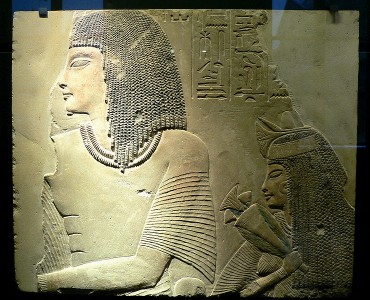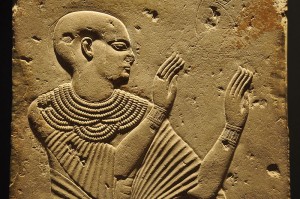 For the last five or six days, I’ve been searching the web for good, reliable news about what is happening to Egypt’s antiquities as the turmoil deepens in Cairo.
For the last five or six days, I’ve been searching the web for good, reliable news about what is happening to Egypt’s antiquities as the turmoil deepens in Cairo.
Are Egyptian artifacts safe in the country’s many museums, protected by soldiers perched on tanks or by human chains of young Egyptians? Or are gangs of looters taking advantage of the legitimate quest for democracy in Egypt, and breaking into the country’s many museums and plundering its archaeological sites? In other words, are we about to see a dire loss of archaeological data similar to the one that took place in Iraq shortly after the American- and British-led invasion in 2003?
Clearly the current Egyptian government, or what remains of it, has its work cut out for it in protecting Egypt’s archaeological record. The country boasts nearly two dozen museums, large and small, scattered throughout the country: Many preserve troves of ancient artifacts. If these are broken into and looted, important works of art could quickly disappear into an antiquities market greedy for such treasures.
 But that’s not the entire problem. The government also has to protect known archaeological sites–many hundreds of them–from gangs of potential looters just waiting for a chance to grab their shovels and get to work. And then there are the magazines–warehouses or large storage lockers located on or near major sites. These are often crammed with newly discovered antiquities.
But that’s not the entire problem. The government also has to protect known archaeological sites–many hundreds of them–from gangs of potential looters just waiting for a chance to grab their shovels and get to work. And then there are the magazines–warehouses or large storage lockers located on or near major sites. These are often crammed with newly discovered antiquities.
Is the Mubarek government still capable of guarding all this from the nation’s poor?
Early news reports focused on the situation at the venerable Egyptian Museum in Cairo, where Tutanhkamun’s artifacts are currently displayed and stored. There looters smashed windows on the museum’s roof and lowered themselves by rope to the floor. After destroying a dozen or so display cases, they badly damaged two prominent mummies and targeted some of Tutankhamun’s treasures. After the official announcement of the destruction, the Mubarek government dispatched soldiers on tanks to the museum to protect it.
But what about all the other museums and sites? Rumors are swirling. Some reports paint scenes of widespread looting in the countryside beyond Cairo. But government officials say they have the situation in hand and are successfully guarding museums and sites alike. Meanwhile other observers hint darkly that the reports of massive looting originated with Mubarek operatives who wanted to tarnish the pro-democracy demonstrations. What’s really going on ?
The best sources of up-to-date information I’ve found so far are two Facebook pages: Egyptologists for Egypt. Supporting the People’s Demands and Restore + Save the Egyptian Museum. There Egyptologists and other informed parties are posting the latest news they’ve received from the field, as well as links to news stories and to official Egyptian government pronouncements. Both are big, contradictory masses of information, but sifting through them carefully, I’d say that looters are definitely taking advantage of the chaos in some key sites.
 Here’s one worrying example. Maartin Raven, an Egyptologist at the Dutch National Museum of Antiquities, went on Radio Netherlands Worldwide yesterday to describe the reports he had just received of the major looting at Saqqara, a vast and very important necropolis for the ancient Egyptian capital of Memphis. “There is no security, only total anarchy,” Raven said. “Armed gangs are unearthing artefacts illegally all over the country. Pyramids and sealed private graves have been broken open, storerooms and depots have been plundered.”
Here’s one worrying example. Maartin Raven, an Egyptologist at the Dutch National Museum of Antiquities, went on Radio Netherlands Worldwide yesterday to describe the reports he had just received of the major looting at Saqqara, a vast and very important necropolis for the ancient Egyptian capital of Memphis. “There is no security, only total anarchy,” Raven said. “Armed gangs are unearthing artefacts illegally all over the country. Pyramids and sealed private graves have been broken open, storerooms and depots have been plundered.”
Raven is a cautious archaeologist, someone I’ve interviewed in the past, and I find it hard to believe he would give such an interview without having good information in hand. And his description of the situation seems to be supported by a worrying photo that The Sun in London published yesterday morning of a gang of looters digging at the unguarded site of Abusir, another major necropolis north of Saqqara. The loss of data from such activities could well be incalculable.
Several commentators see the current situation in Egypt as a powerful argument against the repatriation of Egyptian antiquities, such as missing artifacts from Tutanhkamun’s treasure, to Egyptian museums. I’ve long supported the repatriation movement, but the recent events in Egypt have given me pause for thought–a long hard thought.
Photos: Top. A Saqqara tomb relief from the 18th dynasty, courtesy of Clio 20. Middle. Demonstrators on an army truck in Cairo on January 29, 2011, courtesy Ramy Raoof. Bottom. The pharoah Horemheb, whose tomb lies at Saqqara. Courtesy Michiel.
It’s a heartbreaking situation. There are several scenes of the Antiquities museum on the news. Smashed statues and cases. I hadn’t realised there are warehouses full of artifacts by sites. How on earth can they be protected in the present situation. One wonders if the bogus president has ordered such looting and fighting himself now that he is cornered?
Rosie. It’s a godawful situation for sure. There are some really worrying reports this morning on Egyptologists for Egypt from Salima Ikram, a prominent Egyptologist in Cairo. She says that Mubarek’s forces are throwing Molotov cocktails towards the Egyptian Museum, which is in the center of Cairo. She also says that that the government is NOT helping to protect archaeological sites in the provinces. This is very bad news.
Latest I got this evening was that the Army has turned around and is protecting the Museum against all comers. Let’s hope this holds.
There’s an argument that says, though, that the Museum is the least important part. Its stuff is well-known, it has been published, mostly, there are inventories, it would be hard to get it onto the market. The troublesome places are the warehouses and the undug sites where we don’t know what we’re losing. It’s a question of knowledge versus shiny artefacts.
I’m worried about all of it Jonathan. I agree that the magazines and undug sites contain data yet to be sifted through and analyzed. But the Egyptian Museum also has a large storage basement containing artifacts that are not well-studied and well-known. Moreover, those shiny artifacts in the display cases upstairs in Egyptian Museum can always yield new data as new scientific techniques are developed. I’d hate to see any of this data lost.
Slightly to-the-left of the topic, but concern over looting in Egypt got me thinking about how I’ve heard it said that once an artifact is looted it loses all scientific/historical value. Is this really true? I mean, obviously, once out of context the amount of archaeological data that can be drawn from them is sharply decreased, but do artifacts that are looted, but, say, eventually recovered really just so much trash to be thrown in the rubbish pile from a scientific standpoint?